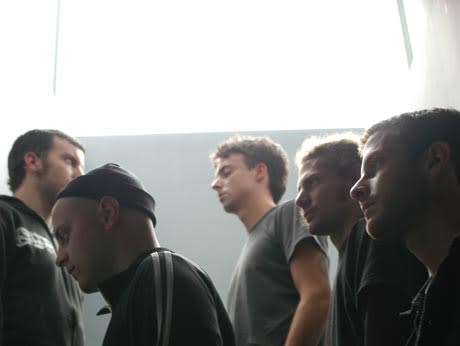On 2002's Oceanic, hardcore deconstructionists Isis, like Neurosis before them, perfected their neo-tribal metal by juxtaposing massive slabs of ambience with demolishing aggro-chordage. With the release of their new album Panopticon (on Ipecac), they have furthered their cause by embracing the philosophy of Michel Foucault, French philosopher and postmodernist.
"The title was roughly supposed to sum up the lyrical content and subject matter, which was initially inspired by an essay in his book Discipline And Punish," says guitarist and vocalist Aaron Turner. "The essay was on panopticism, the theoretical ideas behind the panopticon, an architectural figure." But how do old blueprints for a prison with a central surveillance hub factor into their music? "One of the thematic elements lyrically is the uncertainty of knowing whether or not you're being watched, which is the idea behind the panopticon, invented by [18th century English reformer] Jeremy Bentham," Turner says. "Those being surveilled could not see those who were surveilling them – and they never really knew whether or not they were being watched, so they modified their own behaviour as a result."
The track "Altered Course," for example, builds an atmosphere so dense that you think the aggression is going to kick in after the next measure but it never does. "We wanted to try something more subdued to prolong that sense of anticipation," he says. "We tried to inject elements that would create uncertainty. There's an ebb and flow between the discordant and the melodic, and there're things buried deep in the mix that you don't really hear unless you're paying close attention – and at times you're not even sure if they're there or not." Despite these lofty ideals, Isis didn't reinvent the wheel on Panopticon, according to Turner. "We've been moving in a more atmospheric, textural, and melodic direction ever since the beginning. By finding the equilibrium between the bludgeoning and the layering, we wanted to create some suspense and tension."
"The title was roughly supposed to sum up the lyrical content and subject matter, which was initially inspired by an essay in his book Discipline And Punish," says guitarist and vocalist Aaron Turner. "The essay was on panopticism, the theoretical ideas behind the panopticon, an architectural figure." But how do old blueprints for a prison with a central surveillance hub factor into their music? "One of the thematic elements lyrically is the uncertainty of knowing whether or not you're being watched, which is the idea behind the panopticon, invented by [18th century English reformer] Jeremy Bentham," Turner says. "Those being surveilled could not see those who were surveilling them – and they never really knew whether or not they were being watched, so they modified their own behaviour as a result."
The track "Altered Course," for example, builds an atmosphere so dense that you think the aggression is going to kick in after the next measure but it never does. "We wanted to try something more subdued to prolong that sense of anticipation," he says. "We tried to inject elements that would create uncertainty. There's an ebb and flow between the discordant and the melodic, and there're things buried deep in the mix that you don't really hear unless you're paying close attention – and at times you're not even sure if they're there or not." Despite these lofty ideals, Isis didn't reinvent the wheel on Panopticon, according to Turner. "We've been moving in a more atmospheric, textural, and melodic direction ever since the beginning. By finding the equilibrium between the bludgeoning and the layering, we wanted to create some suspense and tension."
